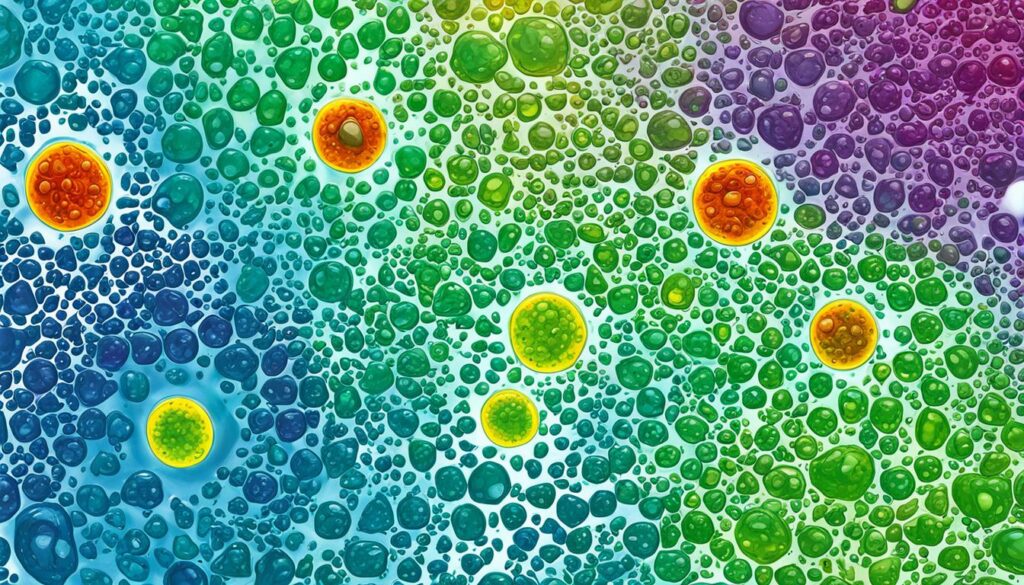Water fasting has become more popular as a way to stay healthy and live longer. Studies show it can start a process called autophagy in cells. This process is key to keeping cells healthy and fighting chronic diseases. By knowing how water fasting and autophagy work together, people can use this method for better health.
Autophagy is when cells clean out damaged or old parts. It’s vital for keeping cells in balance and stopping harmful buildup. Water fasting starts this cleaning by making cells stressed, which triggers the recycling process.
Research says intermittent fasting, which switches between eating and fasting, boosts autophagy. Adding water fasting to this routine helps cells recycle better. This has many health perks, like less inflammation, better brain function, and living longer.
Key Takeaways
- Water fasting can trigger the cellular recycling process known as autophagy, which is essential for maintaining cellular health and preventing chronic diseases.
- Autophagy helps break down and recycle damaged or unwanted cellular components, preventing the accumulation of cellular debris that can lead to health issues.
- Intermittent fasting, which involves alternating periods of fasting and eating, can effectively stimulate autophagy when combined with water fasting.
- Optimizing fasting metabolism through water fasting and intermittent fasting can lead to numerous health benefits, such as reduced inflammation, improved brain function, and increased longevity.
- Understanding the connection between water fasting and autophagy allows individuals to harness the power of this cellular mechanism for improved overall well-being.
Understanding Autophagy: The Body’s Cellular Recycling Process
Autophagy is a key part of how our cells stay healthy and last a long time. It’s when our cells break down and recycle old or damaged parts. This process helps our cells renew themselves and get rid of waste. Learning about autophagy helps us see how our bodies keep our cells working well.
What is Autophagy?
Autophagy is a way cells protect themselves by recycling their own parts. Cells take some of their stuff, like organelles and proteins, and put it in a bag called an autophagosome. Then, this bag merges with another part of the cell called a lysosome. Inside the lysosome, enzymes break down the stuff into simple parts. These parts can then be used by the cell for energy or making new stuff.
The Importance of Autophagy in Cellular Health
Autophagy is crucial for keeping cells healthy by:
- Getting rid of damaged parts to stop them from causing harm
- Recycling parts to save energy and resources when there’s not enough food or stress
- Providing building blocks for making new cell structures
- Helping cells adjust to changes and stress
This process keeps cells working right, which is good for our health and how long we live.
The Role of Lysosomes in Autophagy
Lysosomes are key in autophagy. They’re small bags filled with enzymes that break down cell parts. When an autophagosome joins a lysosome, the enzymes inside break down the cell stuff. This releases nutrients and parts that the cell can use again.
How well lysosomes work is important for autophagy to happen right. If lysosomes don’t work well, cells can’t get rid of waste properly. This can lead to diseases, showing why healthy lysosomes are key for getting rid of waste.
| Autophagy Stage | Description |
|---|---|
| Initiation | The cell senses stress or nutrient deprivation and initiates the formation of an autophagosome. |
| Elongation | The autophagosome membrane expands and encloses a portion of the cytoplasm, including organelles and proteins. |
| Maturation | The autophagosome fuses with a lysosome, forming an autolysosome. |
| Degradation | Lysosomal enzymes break down the enclosed cellular components into their basic building blocks. |
| Recycling | The resulting nutrients and building blocks are released back into the cytoplasm for reuse by the cell. |
Autophagy is a vital process that helps our cells deal with stress, save resources, and stay healthy. By understanding how autophagy works and its role in recycling and waste removal, we see how amazing our cells are at adapting to challenges.
The Benefits of Autophagy for Health and Longevity
Autophagy is the body’s way of recycling cells. It helps keep us healthy and can make us live longer. It gets rid of damaged parts of cells, keeping them working right. This stops harmful stuff from building up and causing diseases.

Autophagy and Chronic Disease Prevention
Autophagy can lower the risk of chronic diseases. It removes damaged parts and stops harmful proteins from building up. This can help prevent heart disease, diabetes, and cancer.
Studies show that eating less or fasting can improve heart health and make insulin work better. It also lowers inflammation, which helps prevent chronic diseases.
Autophagy and Brain Health
Autophagy is key for a healthy brain. It keeps the brain clear of harmful proteins and damaged parts. This helps keep the brain working well and slows down aging.
By doing things like fasting, we can boost autophagy. This might help prevent age-related brain problems and keep the brain healthy.
“Autophagy is a key biological process that enables cells to adapt to stress and maintain cellular homeostasis. Its dysregulation has been linked to various age-related disorders, including neurodegenerative diseases.” – Dr. Beth Levine, Director of the Center for Autophagy Research at UT Southwestern Medical Center
Autophagy and Immune System Function
Autophagy also helps the immune system. It gets rid of harmful invaders inside cells and makes antibodies. This makes our body stronger against infections and diseases.
Studies show that boosting autophagy can help fight off viruses and bacteria. This lowers the chance of getting sick and keeps us healthy.
| Benefit | Mechanism | Potential Impact |
|---|---|---|
| Chronic Disease Prevention | Removal of damaged cellular components and prevention of toxic protein accumulation | Reduced risk of heart disease, diabetes, and cancer |
| Brain Health and Neuroprotection | Clearance of misfolded proteins and damaged cellular components in the brain | Preserved cognitive function and reduced risk of neurodegenerative disorders |
| Immune System Boost | Elimination of intracellular pathogens and enhanced antibody production | Strengthened natural defenses against infections and diseases |
By using autophagy through fasting, eating less, and exercising, we can keep our cells healthy. This lowers the risk of diseases, helps our brain, and boosts our immune system. Adding these to our lifestyle can make us feel better and live longer.
The Connection Between Water Fasting and Cellular Autophagy
Water fasting is a strong way to start cellular autophagy. This process helps recycle and renew cells. By cutting calories and causing a temporary hunger state, water fasting makes cells stressed. This stress starts the autophagy process.
When fasting in water, cells get less nutrients. This tells them to save energy and start breaking down old or damaged parts. This helps the body make energy and fix damaged cells.
“Autophagy is a vital cellular process that helps maintain cellular homeostasis and promotes longevity. Water fasting is a powerful way to induce autophagy and unlock its potential health benefits.” – Dr. Jason Fung, author of “The Complete Guide to Fasting”
Studies show water fasting can help in many ways:
- Improved cellular health and function
- Enhanced metabolic flexibility and fat burning
- Reduced inflammation and oxidative stress
- Protection against age-related diseases, such as heart disease, diabetes, and neurodegenerative disorders
- Potential adjuvant therapy for cancer treatment
How long you need to fast to see big benefits varies. Fasts from 24 hours to several days can work well. Even shorter fasts, like 16-18 hours, can help increase autophagy.
Water fasting can boost health and longevity but should be done carefully. It’s best with a doctor’s advice, especially if you have health issues or take certain medicines.
Using water fasting and autophagy can lead to better health and longer life. It’s a natural way to improve cell function and health.
How Fasting Induces Autophagy in the Body
Fasting is a powerful tool for inducing autophagy, the body’s natural cellular recycling process. When we fast, our bodies go through changes that trigger autophagy. This helps clean our cells of damaged parts and promotes health. Let’s see how fasting starts this amazing process.

Reduced Nutrient Availability During Fasting
Fasting reduces nutrient availability, which is key to starting autophagy. Our cells lack their usual energy sources like glucose from food. This lack of nutrients signals our cells to start breaking down and recycling damaged parts. It helps cells make energy and essential nutrients for staying healthy.
Studies show fasting for 24 hours or more can start autophagy in different tissues and organs. But, how long and how much fasting affects autophagy can vary. Researchers like Jason Fung say autophagy might peak at 20-24 hours into a fast. This shows the need for longer fasting for the best cell renewal.
Hormonal Changes During Fasting
Fasting changes our hormones, helping to activate autophagy. Insulin levels go down, and glucagon levels go up. Insulin helps store energy and stops autophagy, while glucagon breaks down stored energy and starts autophagy.
As we fast, our insulin levels drop, and glucagon levels rise. This shift helps our cells switch from storing energy to using it. It also makes our cells more sensitive to insulin, helping control blood sugar levels and keep our metabolism healthy.
Cellular Energy Conservation and Autophagy
When we fast, our bodies save energy, focusing on the most important cell functions. This shift triggers autophagy to use resources wisely and keep cells healthy. Autophagy breaks down and recycles damaged parts, saving energy and making new building blocks for repair.
Fasting also turns on key cellular pathways, like AMP-activated protein kinase (AMPK). AMPK is a key player in starting autophagy when there’s not enough nutrients. It helps cells stay strong and work well, even when fasting.
| Fasting Duration | Effects on Autophagy |
|---|---|
| 12-16 hours | Initiation of autophagy |
| 16-24 hours | Peak autophagy activity |
| 24-48 hours | Sustained autophagy and cellular renewal |
| 48+ hours | Extended fasting periods, potential risks |
Understanding how fasting starts autophagy helps us use it for better health and disease prevention. But, it’s important to fast safely and with a doctor’s advice. Fasting too much or for too long can be risky and isn’t good for everyone.
Different Fasting Strategies for Inducing Autophagy
There are many fasting strategies to induce autophagy, a process that recycles cells for health and longevity. These include calorie restriction, intermittent fasting, and extended fasting. Each method has its own benefits and challenges. Water fasting is a popular choice for its benefits in autophagy and overall health.
Calorie Restriction (CR) and Autophagy
Calorie restriction means eating 10-40% fewer calories while still getting enough nutrients. This can trigger autophagy by making the body feel stressed, which starts cell repair. Studies show it can increase lifespan and improve health in animals. But, we need more research to see its effects in humans.
Intermittent Fasting (IF) Methods
Intermittent fasting is a growing trend that switches between eating and fasting. Here are some ways to do it:
- 16/8 Method: This involves fasting for 16 hours and eating in an 8-hour window.
- Eat-Stop-Eat: This method means fasting for 24 hours once or twice a week, eating normally the rest of the time.
- 5:2 Diet: This diet limits calories to 500-600 on two days a week, eating normally the other five days.
These methods can boost autophagy by making the body recycle old cells and make new, healthy ones.
Extended Fasting and Autophagy
Extended fasting, from 24 hours to several days, can trigger a stronger autophagic response. Studies show autophagy starts in animals after 24 to 48 hours of fasting. It gets stronger with longer fasts. But, it’s important to be careful and get advice from a doctor, as it can be risky for some people.
| Fasting Duration | Autophagic Response |
|---|---|
| 12-16 hours | Moderate autophagy stimulation |
| 24-48 hours | Longer-term moderate autophagic response |
| 48+ hours | Significant activation of autophagy |
The best fasting method for autophagy varies by age, genetics, health, and hormones. Always talk to a doctor before starting any fasting plan to make sure it’s safe and right for you.
The Role of Diet in Supporting Autophagy
Fasting is great for starting cellular autophagy, but what we eat during eating times is also key. Eating foods full of nutrients helps our cells recycle and renew themselves. This leads to better health and longer life.
One important part of an autophagy diet is polyphenols. These are plant compounds that protect cells and fight off harm. Foods like green tea, red wine, nuts, onions, apples, berries, turmeric, soybeans, and milk thistle are full of polyphenols. They help start autophagy and keep cells healthy. Adding these foods to your diet can make fasting work better and keep cells running well.
A 2018 review in Nutrients shows that fasting and eating less can start autophagy. This highlights how important diet is for cell renewal.
It’s also key to eat the right amount of protein to support autophagy and keep muscles strong. Aim for about 0.8 grams of protein per kilogram of your weight. Choose high-quality sources like:
- Lean meats (chicken, turkey, fish)
- Eggs
- Legumes (beans, lentils, peas)
- Nuts and seeds
- Greek yogurt and cottage cheese
To help autophagy through diet, try these tips:
- Choose whole, less processed foods
- Eat fewer refined carbs and sugars
- Add healthy fats from avocados, olive oil, and fatty fish
- Eat a variety of colorful fruits and veggies for more polyphenols
- Drink plenty of water, herbal teas, and other calorie-free drinks
| Autophagy-Promoting Foods | Key Compounds | Potential Benefits |
|---|---|---|
| Green tea | Epigallocatechin gallate (EGCG) | Stimulates autophagy, supports brain health |
| Red wine | Resveratrol | Induces autophagy, may promote longevity |
| Berries (blueberries, raspberries) | Anthocyanins | Enhance autophagy, protect against oxidative stress |
| Turmeric | Curcumin | Upregulates autophagy, supports brain and heart health |
| Milk thistle | Silymarin | Promotes autophagy, supports liver function |
Eating an autophagy diet full of polyphenols, getting enough protein, and eating well can help your body recycle cells naturally. This can make fasting work better and improve your health and longevity.
Lifestyle Factors That Optimize Autophagy
Many lifestyle choices can boost autophagy, the process where cells clean themselves. Adding these habits to your daily life can help your cells renew and keep you healthy and young.
Exercise and Autophagy
Exercise is key to boosting autophagy, especially with HIIT. HIIT means short, intense workouts followed by rest. This type of exercise helps muscles and increases autophagy markers.
Even moderate exercise for longer times can also trigger autophagy. This gives everyone a chance to improve their health, no matter their fitness level.
Stress Management for Autophagy Support
Too much stress can hurt cell health and slow down autophagy. Using stress-reducing activities like meditation and deep breathing can help. These practices lower inflammation, boost the immune system, and make you feel better overall.
The Importance of Sleep for Cellular Renewal
Good sleep is vital for cell health and autophagy. While sleeping, cells clear out waste and fix damaged parts. Try to get 7-9 hours of quality sleep each night.
Having a regular sleep schedule and a calming bedtime routine can also improve sleep quality. This supports autophagy.
Staying Hydrated to Facilitate Autophagy
Drinking enough water is key for cell processes, including autophagy. Water helps break down cellular components and remove waste. Drink at least 8 glasses of water a day, and more during fasting or intense workouts.
| Lifestyle Factor | Autophagy-Enhancing Strategies |
|---|---|
| Exercise | HIIT, moderate-intensity exercise for longer durations, resistance training |
| Stress Management | Meditation, deep breathing exercises, yoga |
| Sleep | 7-9 hours per night, consistent sleep schedule, relaxing bedtime routine |
| Hydration | Drink at least 8 glasses of water per day, increase intake during fasting or intense exercise |
Adding these lifestyle habits to your daily routine can help your body support autophagy. Remember, being consistent is important. Even small changes can make a big difference in your health over time.
Potential Risks and Considerations of Fasting for Autophagy
Fasting can help with autophagy and improve cell health, but it should be done carefully. It’s best to have a healthcare professional guide you. Not planning your fasting can lead to not getting enough nutrients, which is bad for your health.
A balanced diet can cut cancer risk by 30–67%, says the American Cancer Society (2012). This shows how important eating right is.
Fasting might cause metabolic problems, especially if you have health issues or take certain medicines. A study in 2003 found a link between obesity, metabolism, and disease risk. Also, fasting can make you lose muscle, which is bad news for older people who already lose muscle naturally.
Autophagy can protect against some diseases like cancer, but too much of it can be bad. Cancer cells might use autophagy to survive, as shown in a 2015 study. So, people with cancer or chronic illnesses should talk to their doctor before fasting.
To make fasting safe and effective, focus on eating well, staying active, and getting enough sleep. Working with a healthcare expert and listening to your body is key. This way, fasting can help your cells and overall health.




